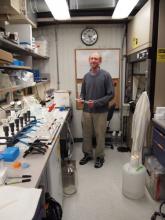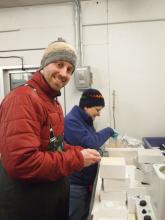Update
The archive is now available! from the PolarConnect live event with PolarTREC Teacher Paula Dell and the research team which was held on Friday, 27 May 2011.
What Are They Doing?
Antarctic icefish are uniquely adapted to life in the extreme conditions of the Southern Ocean. Waters surrounding Antarctica are unlike any other, they are isolated, very cold, have large amounts of dissolved oxygen, and have low numbers of competing animals.
Because of this unique environment, the icefish have evolved with some interesting traits. They do not have a swim bladder, and they spend much of their time near the ocean floor. To help them survive in the very cold waters, they have antifreeze proteins in their blood and body that keep their cells from freezing. Because of the high oxygen content in Antarctic waters, the icefish are able to survive with lower amounts of hemoglobin, the protein that carries oxygen to the rest of the body, than other fishes.
Scientists believe that the unique characteristics of icefish cell structure may be connected to how well they are able to withstand increases in ocean temperature. Because of this, Antarctic icefish may signal the impacts of climate change on the water temperature of the Southern Ocean.
The research team captured the icefish by trawling from the R/V Laurence M. Gould. After catching them, they placed the icefish in tanks at Palmer Station. By changing water conditions in the tanks, the team studied the fishes tolerance to changing conditions. They also took tissue samples from the fishes for future experiments at their home institutions.
Where Are They?
Members of the research team boarded the Research Vessel (R/V) Laurence M. Gould in Punta Arenas, Chile for a four-day voyage to Palmer Station, Antarctica. While on board, the team trawled and captured fish to study at the station. Palmer Station is located on Anvers Island midway down the Antarctic Peninsula. It is operated by the U.S. Antarctic Program and is one of three United States research stations located in Antarctica. During the austral summer around 40 people live and work at the station, with that number going down to between 15 and 20 during the winter months.
Latest Journals

Kristin O'Brien is an associate professor of biology at the Institute of Arctic Biology within the University of Alaska Fairbanks. Her research is aimed at understanding how fishes maintain energy production at cold temperatures. She investigates the unique physiological and biochemical adaptations that have arisen in Antarctic fishes during their evolution in the icy cold waters of the Southern Ocean. Learn more about Dr. O'Brien and her work here.
Dr. Bruce Sidell, co-Principal Investigator on this research project, died of cancer on February 8, 2011 at the age of 62. Bruce was a Professor of Marine Sciences at the University of Maine in Orono for 34 years, where he was also the founding Director of the School of Marine Sciences. Bruce was an international leader in the field of comparative physiology and the biochemistry of fishes and conducted research on Antarctic notothenioid fishes for 25 years. He made numerous contributions the field of Antarctic fish physiology, particularly in areas of lipid metabolism, the importance of intracellular lipids in oxygen diffusion, the expression pattern and function of myoglobin in Antarctic icefishes, and most recently, the thermal tolerance of notothenioid fishes. Bruce was passionate about the Antarctic. He enjoyed working on the back deck of the R/V Laurence M. Gould as much as at the lab benches of Palmer Station, and was equally skilled and at home in both places. Bruce contributed significantly to the development of resources for Antarctic science through his work on the Antarctic Research Vessel Oversight Committee and Palmer Area Users Committee. In 2010, Bruce's longstanding commitment to Antarctic science was recognized when the U.S. Geological Service and National Science Foundation named 'Sidell Spur', a feature on Brabant Island in the Antarctic, in his honor. Bruce was an outstanding mentor to many young scientists, several of whom continue working in the Antarctic because of his inspiration and dedication to their training.

Lisa Crockett is an associate professor of physiology in the Department of Biological Sciences at Ohio University. Lisa's primary interests are in metabolic cold adaptation and how membrane compositions are reorganized with variations in body temperatures. Lisa first began working in Antarctica as an undergraduate student with Dr. Art DeVries who discovered the antifreeze glycoproteins in Antarctic fishes. In addition to her role as collaborator in Antarctica, she also studies temperate fishes (e.g., striped bass, saltmarsh minnows and American eel) and the physiological and biochemical mechanisms that enable these animals to tolerate a wide range of temperatures and salinities. You can read more about her work here





